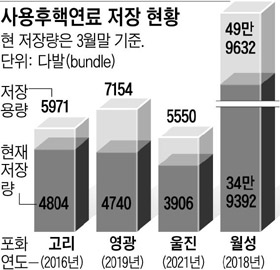입력 : 2012.07.23 03:07
원전 폐기물 4년 뒤부터 포화상태인데, 2년 뒤면 원자력 협정 끝나
<1> 개정 협상 무시하는 미국
<2> 이대로 가면 국가적 재앙 온다
<3> 일본·인도는 되는데 한국은 왜?
<4> '핵무장 안한다' 재천명하자
<5> 획기적 제안으로 해법 찾자
제2부 원자력 협정
세계 5위 원전국가 됐는데 38년 전 협정 그대로 유지

이 서류의 주요 내용은 2014년 상반기 중 협정 효력이 만료되는 한미 원자력협정 개정 협상을 본격화하자는 것이었다. 우리 측은 이 서류에서 한국이 우라늄 농축과 사용후핵연료에 대한 재처리 권리를 가져야 한다는 내용을 담았다. 38년 전에 발효된 이 협정은 한국의 원자력 발전에 도움을 주었지만, '한국의 평화적 목적의 농축·재처리'도 막고 있다.
그러나 미국 측은 5개월이 지난 지금까지 묵묵부답이다. 미국은 한국이 농축·재처리 능력을 확보하게 될 경우 핵무기 개발에 성큼 다가설 수 있는 능력을 갖게 되고, 이것이 동북아는 물론 세계적으로 핵 비확산 정책에 나쁜 선례가 될 수 있다는 점을 우려하고 있다.
이런 이유에서 미국은 사용후핵연료 재처리 기술인 '파이로 프로세싱(건식처리공법)'의 공동연구에만 합의했을 뿐, 한국의 주장을 무시하고 있는 것이다.
한국은 상업가동 중인 원전(原電)이 22기로 총 전력 생산량의 35%를 원전에 의존하는 세계 5위의 원전 대국이다.
한국이 재처리를 바라는 가장 큰 이유는 갈수록 심각해지는 사용후핵연료 문제 때문이다. 사용후핵연료는 임시 저장, 중간 저장, 영구 처분의 3단계로 나눠 처분한다. 우리 원전은 한미 원자력 협정에 따른 규제 등으로 인해 원전에서 나오는 사용후핵연료는 현재 100% 원전 내 임시 저장 시설에 보관 중이다. 사용후핵연료는 고리원자력발전소의 경우 2016년에 포화 상태에 이를 것으로 전망돼 대책 마련이 시급한 상황이다.
또 국내에서 우라늄 농축을 할 수 없기 때문에 우라늄 정광(精鑛·옐로 케이크)을 연간 4000여t 사들여 변환 및 농축을 다른 나라에 위탁하는 데 9000억원을 쓰는 것도 시급히 해결해야 할 문제다.
<영문기사- 아래 참조>
U.S. Silent on Korean Request to Reprocess Nuke Fuel
Five months since Korea officially asked the U.S. for permission to reprocess its own spent nuclear fuel rods there has still been no response from Washington.
Korea in February sent a sealed envelope to Robert Einhorn, the U.S. State Department's special adviser for nonproliferation and arms control, saying Seoul wants to start talks on revising a bilateral nuclear energy pact that expires in 2014.
Seoul and Washington signed the pact in 1974 detailing the extent of the nuclear technology Korea can use for civilian purposes.
The bilateral pact has helped Korea develop nuclear power technology but also saddled it with a needless restriction on reprocessing its own nuclear fuel rods. Seoul believes it should have the right to reprocess them and also wants to enrich uranium for power generation.
Washington is concerned that Korea could obtain materials to produce nuclear weapons if it is allowed to enrich uranium and reprocess spent fuel rods, which would set a bad precedent in U.S. efforts to stem proliferation. This is why the U.S. has only agreed to conduct joint research with Korea on reprocessing spent nuclear fuel rods through a process known as pyroprocessing, which does not produce weapons-grade plutonium.
Korea has 22 nuclear power plants, making it the world's fifth largest in terms of nuclear energy facilities. The country relies on nuclear power to produce 35 percent of total energy demand.
The main reason it wants to reprocess the massive amount of spent nuclear fuel rods is that finding space to store the toxic byproduct is becoming a headache.
Spent nuclear fuel is handled in three stages: temporary storage, intermediate storage and permanent disposal. Under the current nuclear energy pact, Korea stores all its spent nuclear fuel in temporary storage facilities at power plants. In the case of the nuclear power plant at Gori in the southeast, the facility is forecast to reach saturation point in 2016.
Another problem is that since Korea is prohibited from enriching uranium, it has to spend W900 billion (US$1=W1,141) every year to purchase around 4.500 tons of yellow cake from abroad and pays other countries to enrich uranium. Yellow cake is the seed material for higher-grade nuclear enrichment

